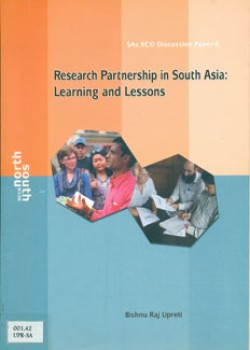
Research Partnership in South Asia
Learning and Lessons
Author : Upreti, B.R.
Publisher: NCCR North-South and South Asia Coordination Office
Place of Publish: Nepal, Kathmandu
Year: 2012
Page Numbers: 56
Acc. No: 4276
Class No: 001.42 UPR-SA
Category: Books & Reports
Subjects: Research Methods
Type of Resource: Monograph
Languages: English
ISBN: 978-9937-2-4699-6
The Regional Coordination Office in South Asia published two discussion papers and a book which address, respectively, the research partnership experience, Nepal’s peace process, and the country’s hopes for the future. This research talks about many issues and problems in South Asia which is very complicated and require multidisciplinary and transdisciplinary approaches to investigate, and it gives out a broad perspective and an understanding about various regional problems. The quality and quantity of the research conducted in various fields such as conflict and peace, conflict and economy, livelihoods and migration, tourism and peace and more, ever since NCCR North-South came into existence, will always remain helpful. Partnership is a social construction shaped by common interests, collective understanding, mutual benefits and concerted efforts. The institutional partnership arrangements in the region are very much guided by these principles. The South Asia research partnership is inherently different toother conventional research approaches, such as research councils funded research projects. Many issues and problems in South Asia are very complicated and require multi-disciplinary and trans-disciplinary approaches to investigation and a broad perspective on and understanding of regional problems. NCCR North-South encourages academic and non-academic partner organisations and researchers to engage in research that addresses the problems of sustainable development. Its contributions are focused on (i) advancing research insights and capabilities, and (ii) the suitability and meaningfulness of research to the everyday practice of poor people, development practitioners, politicians and decision-makers engaged in the improvement of poor people,s livelihoods. The first section presents a general overview including the demographic and the political dynamics of South Asia, and the NCCR North-South research partnership in the region. This section also briefly covers state of the art of the NCCR North-South research focus in the region. The second section presents the results of the study in three subsections, i.e., capacity building (individual and institutional) focusing on visibility and recognition, managerial and technical capacity, the effects of research on development cooperation and the determinants of good practices. The third section discusses the research findings under the subheadings achievements and outcomes, and, the fourth section presents conclusions and the way forward.



